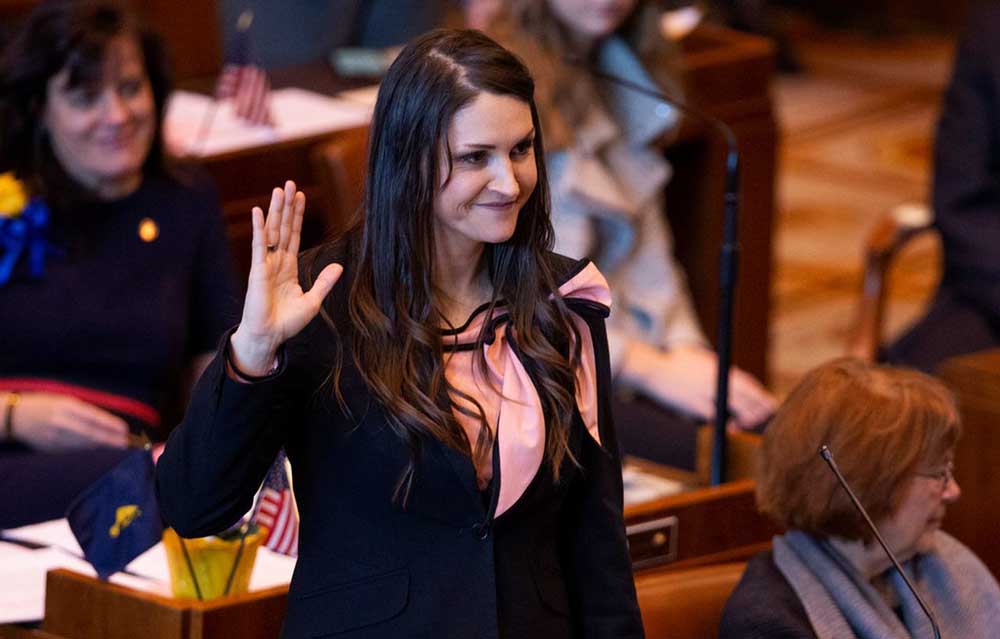Gov. Kotek knew of Fagan’s pot contract a week before it was made public
Published 4:45 am Tuesday, May 16, 2023

- Oregon Sen. Shemia Fagan, D-Portland, won the Democratic primary for the Oregon secretary of state's office. In this file photo, Fagan is sworn in as a senator Jan. 14, 2019, at the Capitol.
Gov. Tina Kotek learned Secretary of State Shemia Fagan had an outside marijuana consulting contract and had recused herself from an audit of the Oregon Liquor and Cannabis Commission’s pot regulation system eight days before Fagan’s side job became public, the governor’s office said late Monday.
Kotek’s spokesperson said the governor and Fagan met on April 19 for their first official meeting to “discuss the legislative session and other topics unrelated to cannabis.”
During that conversation, Fagan “briefly mentioned” she had recused herself from the ongoing audit of the state’s cannabis program “due to a consulting contract,” spokesperson Elisabeth Shepard said in an email.
Fagan told Kotek she had obtained an opinion from the Oregon Government Ethics Commission about the contract, Shepard said.
Kotek did not know “the details” of Fagan’s outside arrangement “until that information broke in the press,” Shepard said in response to a question from The Oregonian/OregonLive about when the governor first became aware of Fagan’s contract.
Willamette Week on April 27 first reported Fagan’s contract with Rosa Cazares and Aaron Mitchell, the owners of the embattled cannabis company La Mota. Kotek on April 29 criticized Fagan’s arrangement, suggesting she had only learned of the contract when the news broke that week.
“I’m certainly very dismayed by the press reports about what’s been going on with the Secretary of State and her relationship with her outside work,” she told reporters at an event in Multnomah County.
Kotek asked the Oregon Government Ethics Commission to investigate the situation and asked the Oregon Department of Justice to examine the audit of the OLCC from Fagan’s office.
Fagan apologized on May 1 and resigned from her job May 2, saying she had broken the public’s trust in taking the consulting job.
Fagan had accepted a $10,000-a-month consulting contract in February from a La Mota affiliate owned by Cazares.
Fagan’s last day as secretary of state was May 8. Fagan’s full-time job as secretary of state pays $77,000 annually, which she said was “not enough for me to make ends meet.”
Fagan said she met La Mota co-owners Cazares and Aaron Mitchell in fall 2020, when she was running for secretary of state. Mitchell has contributed $45,000 to Fagan’s political action committee since 2020.
Fagan called the Ethics Commission on Feb. 9 and talked with compliance specialist Monica Walker about the consulting contract, according to the records released by the Secretary of State’s Office.
Walker followed up with an email that included advisory opinions that she said appeared to apply to Fagan’s situation. The 2013 opinions related to whether then-Gov. John Kitzhaber could accept fees for speaking engagements on the topic of healthcare policy.
The opinions generally said Kitzhaber’s situation would not violate ethics rules and offered guidelines for the situation, saying the commission “has long recognized that there are public officials who have and will continue to pursue private income producing activities while holding public positions.”
“Difficulties may arrive, however, when the distinction between private and public roles become blurred,” the opinion states.
Walker advised that the Ethics Commission would need a “detailed description of the circumstances (the contract you are developing and the private employment activities you would be engaging in)” for a more formal opinion.
Walker ended the email by reminding Fagan that her request for an opinion or letter of advice “would be a public record.”
Fagan did not follow up with a request for an opinion.
“Thanks for the follow up discussion today and clarity on conflicts of interest,” Fagan emailed Walker. “I’ve appreciated your guidance and answers to my questions.”
Fagan sent an email to the staff recusing herself from the audit on Feb. 15, but records show the review was mostly done by then.
Records show Fagan sought input on the audit from Cazares and appears to have revised the initial audit framework based on her feedback. Cazares was interviewed during the audit process. The audit focused on regulations’ impact on cannabis businesses, concluding that overregulation is stifling the industry.




